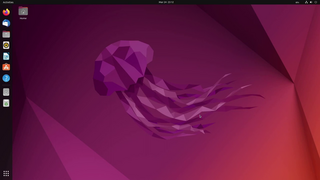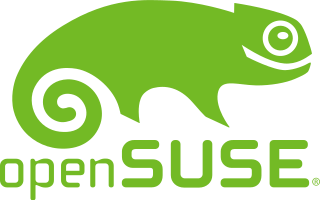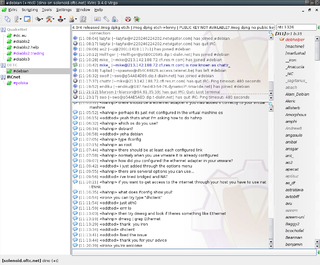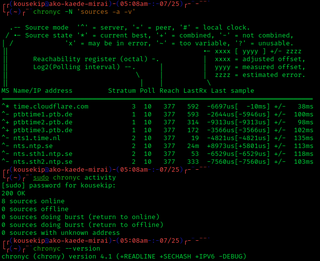Related Research Articles

A Linux distribution is an operating system made from a software collection that includes the Linux kernel and, often, a package management system. Linux users usually obtain their operating system by downloading one of the Linux distributions, which are available for a wide variety of systems ranging from embedded devices and personal computers to powerful supercomputers.

YaST is a Linux operating system setup and configuration tool.
Gentoo Linux is a Linux distribution built using the Portage package management system. Unlike a binary software distribution, the source code is compiled locally according to the user's preferences and is often optimized for the specific type of computer. Precompiled binaries are available for some larger packages or those with no available source code.

GNOME Evolution is the official personal information manager for GNOME. It has been an official part of GNOME since Evolution 2.0 was included with the GNOME 2.8 release in September 2004. It combines e-mail, address book, calendar, task list and note-taking features. Its user interface and functionality is similar to Microsoft Outlook. Evolution is free software licensed under the terms of the GNU Lesser General Public License (LGPL).
phpLDAPadmin is a web app for administering Lightweight Directory Access Protocol (LDAP) servers. It's written in the PHP programming language, and is licensed under the GNU General Public License. The application is available in 14 languages and supports UTF-8 encoded directory strings.
Technical variations of Linux distributions include support for different hardware devices and systems or software package configurations. Organizational differences may be motivated by historical reasons. Other criteria include security, including how quickly security upgrades are available; ease of package management; and number of packages available.

openSUSE is a project that serves to promote the use of free and open-source software.
cdrtools is a collection of independent projects of free software/open source computer programs.

PulseAudio is a network-capable sound server program distributed via the freedesktop.org project. It runs mainly on Linux, various BSD distributions such as FreeBSD and OpenBSD, macOS, as well as Illumos distributions and the Solaris operating system.
OtherOS is a feature of early versions of the PlayStation 3 video game console, allowing user installed software, such as Linux or FreeBSD. The feature was removed since system firmware update 3.21, released on April 1, 2010.

TeX Live is a cross-platform, free software distribution for the TeX typesetting system that includes major TeX-related programs, macro packages, and fonts. It is the replacement of its no-longer supported counterpart teTeX. It is now the default TeX distribution for several Linux distributions such as openSUSE, Fedora, Debian, Ubuntu, Termux and Gentoo. Other Unix operating systems like OpenBSD, FreeBSD and NetBSD have also converted from teTeX to TeX Live.
LinuxForums.org was an Internet forum for Linux users needing free help and support with their Linux distributions and software, and computer hardware. It was owned by MAS Media Inc. With more than 200,000 registered members, it was one of the most active Linux forums and free software community sites on the Internet.

RPM Package Manager (RPM) is a free and open-source package management system. The name RPM refers to the .rpm file format and the package manager program itself. RPM was intended primarily for Linux distributions; the file format is the baseline package format of the Linux Standard Base.

Linux-libre is a modified version of the Linux kernel that contains no binary blobs, obfuscated code, or code released under proprietary licenses. In the Linux kernel, they are mostly used for proprietary firmware images. While generally redistributable, binary blobs do not give the user the freedom to audit, modify, or, consequently, redistribute their modified versions. The GNU Project keeps Linux-libre in synchronization with the mainline Linux kernel.

KVIrc is a graphical IRC client for Linux, Unix, Mac OS and Windows. The name is an acronym of K Visual IRC in which the K stands for a dependency to KDE, which became optional from version 2.0.0. The software is based on the Qt framework and its code is released under a modified GNU General Public License.

Linux on IBM Z is the collective term for the Linux operating system compiled to run on IBM mainframes, especially IBM Z and IBM LinuxONE servers. Similar terms which imply the same meaning are Linux on zEnterprise, Linux on zSeries, Linux/390, Linux/390x, etc. The three Linux distributions certified for usage on the IBM Z hardware platform are Red Hat Enterprise Linux, SUSE Linux Enterprise, and Ubuntu.
Dracut is a set of tools that provide enhanced functionality for automating the Linux boot process. The tool named dracut is used to create a Linux boot image (initramfs) by copying tools and files from an installed system and combining it with the Dracut framework, which is usually found in /usr/lib/dracut/modules.d.

Flatpak, formerly known as xdg-app, is a utility for software deployment and package management for Linux. It is advertised as offering a sandbox environment in which users can run application software in isolation from the rest of the system.

chrony is an implementation of the Network Time Protocol (NTP). It's an alternative to ntpd, which is a reference implementation of NTP. It runs on Unix-like operating systems and is released under the GNU GPL v2. It's the default NTP client and server in Red Hat Enterprise Linux 8 and SUSE Linux Enterprise Server 15, and available in many Linux distributions.
References
- ↑ McGrath, Mike (2007-07-12). "Smolt, Open Invitation". Linux Weekly News. Retrieved 2 November 2011.
- ↑ Byfield, Bruce (2007-08-08). "Smolt profiles distro hardware use". Linux.com. Archived from the original on May 21, 2011. Retrieved 2 November 2011.
{{cite web}}: CS1 maint: unfit URL (link) - ↑ "Smolt Privacy Policy". Smolt Wiki. Retrieved 2 November 2011.
- ↑ "Smolt retirement". Fedora. 2012-10-10.
- ↑ "Hardware probe". Fedora Wiki. 2019-08-21.
- ↑ "Smolt". Smolt Wiki. Retrieved 2 November 2011.
- ↑ "Smolt". openSUSE wiki. Archived from the original on 9 July 2010. Retrieved 2 November 2011.
- ↑ "Smolt gets adopted by openSUSE". OSnews.com. 2008-12-09. Retrieved 2 November 2011.
- ↑ "Smolt". Archived from the original on 2009-02-23. Retrieved 2009-02-25.